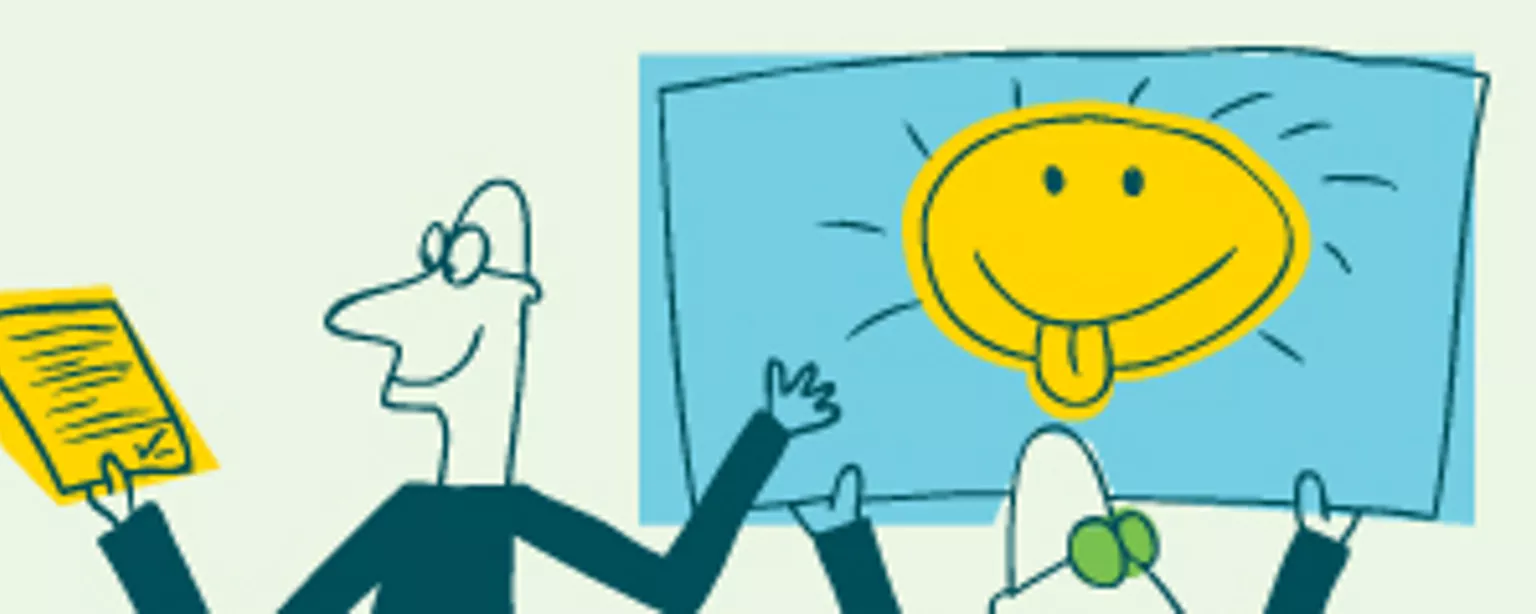Two witty creative professionals share examples of how using humor on the job can help you build rapport, diffuse tension and get what you want.
While the level and type of humor you encounter on the job depends almost entirely on your company culture, humor can be a key to workplace satisfaction and success across the board.
Humor is particularly popular in creative work, but is humor at work as prevalent? "Even though more companies are beginning to understand the value of divergent thinking and creativity, not enough of them structure the workplace to facilitate it," says Heather Bradley, associate creative director at Razorfish in Seattle and former creative director at Cheezburger Network. "Your boss needs to know that joking around and goofing off can lead to smart business solutions."
Bradley recently published Design Funny: A Graphic Designer's Guide to Humor, which features inspiration, advice and visual gags from comedy heavyweights, including The Onion, Comedy Central, Funny or Die, MAD magazine, JibJab and Cheezburger, as well as top creative agencies, freelance designers and professional comedians. We reached out to Bradley and the always-funny Terry Marks, principal at tmarks, to learn more about humor at work. Marks is known throughout the design industry for adding levity to not only his work, but also his workplace, which has helped him win over customers and clients.
Here, Bradley and Marks reveal why you should be using humor at work.
1. Humor is an essential part of being human
"Do you remember your preschool 'How to Laugh' class? Of course you don't," Bradley says. "Nobody taught you to laugh. Babies throughout the world begin laughing around four months old. An appreciation for humor is universal."
2. Humor lends perspective
"In 20-plus years of working in this field, I haven't knowingly caused a death nor gravely injured anyone," Marks says. "Humor clears the air and allows one to focus on the problem or task at hand and move on to more important things."
3. Humor builds rapport
"I hate participating in corporate team-building exercises," Bradley says. "Why should anyone embarrass themselves in front of coworkers? It's awkward. It's uncomfortable. It's incredibly cheesy. So, why do it? Because, believe it or not, it works. When you appear vulnerable, people let down their guard and open up to you.
"For example, I recently attended a new-client brainstorming meeting," Bradley adds. "Since most of us had not been formally introduced, we were all asked to share our first concert experience. Talk about a quick way to get to know someone through humor. Suddenly 'that senior marketing guy with the beard' becomes 'Bob, who at age 11 attended a Backstreet Boys concert with his mom. And his grandma.' When you joke around, you become a person, not just a cog in the machine."
4. Humor diffuses tension with clients and coworkers
"We had elected to offer our services to a nonprofit we liked for whatever they could afford," Marks notes. "I think it was something like $200 a month. We'd design newsletters, annual reports, etc. In a discussion with the executive director, we came to an impasse where we disagreed. We were both staunchly holding to what we believed. At one point, I simply said, 'Well, that's OK.' She said, 'So you agree!' with some hopeful expectation in her voice of having 'won.' 'No,' I replied, 'It's just that you're allowed to be wrong.' She bristled at first, but after a beat we both just laughed and moved on."
5. Humor is for everyone
Surprisingly, Bradley notes that nobody was a crack up at Cheezburger. "In fact, most of us were pretty introverted," she says. "Being shy or quiet doesn't mean you can't still have fun at work. At Cheezburger, we regularly exchanged funny Internet posts, contributed to anonymous Post-it note graffiti in the bathroom and hung meme posters in the kitchen. We also brought our dogs to work. Once my dog accidentally pooped on a coworker's desk. Now that was funny."
6. Humor is powerful
"Humor is a more powerful tool than fear," Marks says. "Case in point: We had an intern in our office that we really liked. She, however, wasn't always enthusiastic about occasionally taking on less-exciting jobs such as recycling. One time when I had a simple task for her, I decided to make it more attractive by proffering a much less attractive task at first:
"Could you do something for me?"
"Um … sure. What do you need?"
"Can you please shave my back?"
"Eeewww!"
"Oh. In that case, will you please do the recycling?"
"Yes!"
How to tell if humor is right
Before you start busting out jokes, you'll need to read your audience and consider whether your sense of humor aligns with theirs. If it does, great. Joke away. If it doesn't, well, then it gets tricky.
"Joking around with a client is a lot like swearing around a client," Bradley says. "When in doubt, let the client break the seal. Encourage them to do so by starting your meeting with a simple icebreaker such as, 'What's your favorite bumper sticker?' If you think your client will respond well to humor, always start tame and subtle. You can always whip out the Sarah Silverman jokes later."
Marks also uses humor to gauge whether a client is a good fit. "When talking to people, it's usually easy to discern when it's possible to ease the situation and simply be oneself," he says. "For me, that sometimes means turning off the 'meeting editor' function and saying what comes to mind; usually something, shall we say, smart-alecky. And that can quickly either diffuse the odd tension of a meeting and/or build a connection. And if it doesn't, well, I know that that person shouldn't be my client."
Happy workers are better workers. Check out The Secrets of The Happiest Companies and Employees, a guide from our company that you can use to increase happiness in your workplace.







